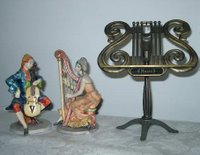Acknowledging with gratitude and delight immediate responses of my invitation from friends and colleagues to visit my first website, Classical Music Lounge. Here are some stimulating comments, in parts:
Prof. Dr. Hans Ueckert:
"Dear Tel,
Looks great, your Classical Music Lounge! Since I'm an absolute "blog innocent" I just played a little around at your website. Most interesting by-product of doing so was that many pages turn out to be in German, particularly help pages and headings of info pages (e.g. at your "View my complete profile" page)..."
(
Note: I'll be announcing Hans's project
'due opere buffe', in particular, its advance performance in a separate entry. Everyone's welcome to discuss interesting points of the Mozart project.
Ben Santillan:
"... thanks for sharing your knowledge, tel. where do you get all the time and energy to do everything you're doing. I'd be very interested to know what you learn about mozart's use of PHI...
The best book I've read about the esoteric sciences and secret societies is Umberto Eco's
Foucault's Pendulum, and he's a real semiotic professor. Semiotics, as you may well know, is the study of signs. There is no such study as symbology, or if there is, it is to semiotics what astrology is to astronomy..."
Maureen Allen (another dear friend, former host of Classical Music at Bella Online):
"Dear Tel, what a great idea! Leave it to you to come up with a way for classical music lovers to share their interest as well as their opinions, etc. After I finish this, I'll go on over and see your new site..."
Daisy Brambletoes: (artist, writer, critic, support, friend ...)
"... Oh, that's really nice, Tel! I like that quite a lot. How do you contribute to it?"
Wim vingerhoed: My roving friend-photographer of Mozart, classical music, and many more ... for all the images and support through the years.
Liz Ringrose: "This is a lovely site. Well done. I keep dipping into it between chunks of re-writing my novel. Did Giacomo Casanova really receive the Golden Spur??? Whatever did he do to promote Catholicism? Fascinating."
Terry McIntee: "Just popped into Classical Music Lounge for a brief visit. What a great idea. It looks fantastic."
(c) July 2006. Tel. Inspired Pen Web. All rights reserved.



